Unionism’s Fear: They Stayed Put & I Can’t Blame Them

Finnian O Domhnaill wonders where unionism tis going. Finnian O Domhnaill is a political writer from Donegal, currently living in Derry. He is the creator of the political page No Bones About It.
On one side you had the hub of an empire that stretched across continents which gave us the industrial revolution, wealth, power and prestige. On the other, abandonment and Fenians.
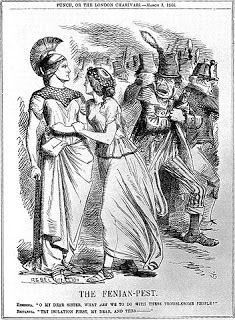
As a man who has a deep passion to see Ireland become truly united and a real sovereign 32 county federal socialist republic, remains sceptical of the British government’s intentions for it’s so called closest friend and sees unionism only as something that stands in the way of seeing a united Ireland to be a reality, I still cannot help but sympathise and recognise as to why those who saw partition as the saving grace to their lives, culture and identity.
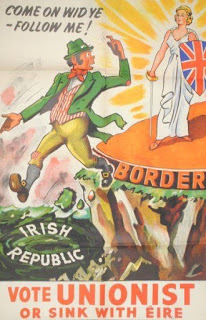
I, as a socialist nowadays, did not always have this view. I was one of those who only seen the glossed over shiny version of the peace process and never had a strong opinion about partition. In fact I more leaned towards it being a good thing. No more bombs and bullets and I could finally go on the pull in Derry without the fear of getting shot or winding up with a protestant because there was peace now and its all good. My naivety back then, poor fella.
As time went on and the more I learned I came to the conclusion that a united Ireland will benefit the whole island and all communities. I also became very bitter towards unionism and all things pro British. I despised the butcher’s apron, John Bull , the queen and all that sort of pomp. I went from a passive novice on one side to somewhat of a republican fundamentalist on the other. To put it simply, I became sectarian but it was ok because my environment supported and encouraged it and my bigotry was justified because ‘’they’’ were the enemy and foreign oppressor.
Fortunately, I found the middle road after continued research and further studies on Irish history, republicanism and Socialism, I realised the real struggle we all face is poverty, class discrimination and inequality. It is still my view that a united Ireland is the best idea for the island but only a 32 county sovereign federal socialist republic. This in turn will allow power to unionism for the whole of Ulster as they previously wanted, pre - partition and grant them to run the show somewhat outside of Irish politics. I believe that unionism has its part to play in this new Ireland.
Unionists/loyalists/protestants should of course have their rights, religion, culture, heritage and customs protected and recognised by the federal government. Although I don't agree with unionism or the North remaining part of the U.K, it is everyone’s inalienable right to practice their identity and if anyone see’s themselves as British then who the hell am I to say they are not or to force them to be Irish or fuck off back to the main land?
Unionism didn’t just pop up over night. There was real reason for centuries as to why many saw union with Britain a good thing. It brought inclusion and industrial development to this rock, straggling hopeless and helplessly at the edge of Europe. Belfast was at the heart of the shipbuilding world, giving us Titanic. It was also the largest city in the whole of Ireland and very wealthy with thanks to Britain.
For those who seen themselves as British and had a protestant faith it can be understandable the fear they had of an independent Ireland disconnected with Britain. Many of those who wanted a free Ireland were Catholic and very much anti British and anti-Protestant. With this in mind many protestant unionists feared that once the connection was broken with Britain, their identity would be denied and be oppressed, their land taken away and feel completely abandoned by their British masters. Where would they belong then?
When the union act was brought in in 1801 this gave Ireland a sort of level pegging with the rest of Great Britain. St Patrick’s cross was added in to the union flag while the harp was added to the sovereign standard giving Ireland the status of not so much a colony or a conquered land subjected to the empire but the empire it self, side by side with England, Scotland and Wales. Britain's struggle was Ireland’s struggle and Britain’s success was Ireland’s success, Ireland’s success was Britain’s success and Irelands struggle was Britain’s. apart from the famine that occurred less than 50 years of union.
When the treaty was drawn up and implemented, It gave the six counties the status quo while giving the 26 counties the title of dominion status of the commonwealth of nations, giving Ireland the new name, Irish Free State. This could of been seen to unionists as a lowering of equal stature with the rest of Britain, global superiority and a return of mere colony status. As we see the superiority complex of DUP members who ‘’hold their noses’’ to the likes of Sinn Fein, you could argue that this mentality runs deep and runs long in the history of unionism.
As the south was dominated by the agriculture sector and was severely underdeveloped compared to the more industrial north, unionists feared their would be a declined in the economy with the British no longer involved and unionist fears that the Irish Government would be concentrating more on the farmer.
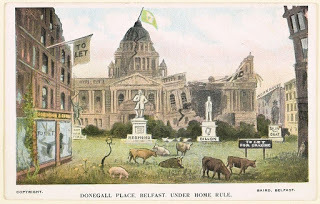 Unionist propaganda of the 'plague' that is an independent Ireland. Notice the huge workhouse sign in the back ground, a symbol of the Irish famine
Unionist propaganda of the 'plague' that is an independent Ireland. Notice the huge workhouse sign in the back ground, a symbol of the Irish famine
When Northern Ireland became its own ‘’wee country’’, the unionists held the overwhelming majority and were able to dictate the destiny of the six counties as well as remaining part of the U.K compared to being a mere minority in the south. Home rule was a definite never for unionism however, a six county home rule was acceptable. The fear of an all island Irish Free State was so stark that they even sacrificed the three counties of Donegal, Monaghan and Cavan. Unionists have always seen Ulster as British but keeping only six counties gave them the majority and dampened their fears of a catholic nationalist rise and a toppling of unionism in the province an a swallowing of the Free Staters.
The years and decades that followed, partition didn't exactly have northern unionists jumping at the chance to join the ‘’republic’’. In 1933, The anti treaty republican party, Fianna Fail led by De Valera, became the minority government with the then socialist Labour party founded by James Connolly. The politicians of the Unionist Alliance dissolved the party in the south and some members joined the pro treaty Cumann na nGaedhael party. This only gave unionism a small voice in the Free State to which it went unheard. The ‘’long fella’’ placed the catholic church in the 1937 constitution as having a ‘’special position’’ in Irish society. Not really something to attract unionists to While James Craig was claiming the North a protestant state for a protestant people.
Of course the main stumbling block of Irish unity which followed partition was the 30 years of conflict were the IRA tried the bomb and shoot their way to Irish unity and in contrast creating a surge in paramilitary loyalism, state collusion, deepening division, fear and rising hatred for anything republican, nationalist, socialist or Irish. To protestants growing up in the north who may not have been at all militant or even pro British now had reason to defend themselves, their family, the union and fight against what they saw as those who were out to destroy their identity, religion and culture.
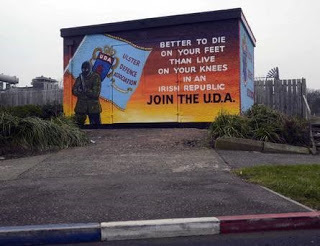
The centuries of unionism’s fear of being isolated and abandoned by the union coupled with the completely undesirable alternative of domination by an Irish catholic majority that would most likely be happy with seeing the demise of the unionist/loyalist/protestant tradition, has trickled down from generation to generation and right up to the present day.
Nowadays there is a greater peace in Ireland through the GFA giving a power sharing Stormont assembly with the DUP being head party in the north and leaving Northern Ireland’s destiny of remaining in the U.K or joining the republic for the people by a democratic vote. Southern Ireland is much more wealthy than the north with a much larger economy and has caught up with the modern world in regards to its dumping of the ‘’special position’’ of the catholic church from the constitution. There has been much improved and greater relations with Britain and is the first country to grant equal marriage. Southern parties are talking and working with unionist parties such as Fine Gael with the DUP and there is more growing north/south relations. The Ireland today is a long way away from the days of plantations were the first Scottish and English settlers felt a million miles from their homeland however, the same fear persists within the unionist community today.
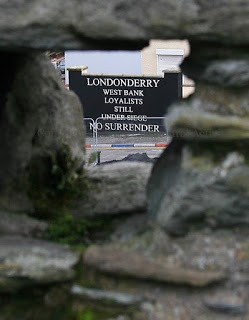
[image error]
As socialists, republicans and as nationalists, we have somewhat a duty that we must always keep in mind, the following: Coupled with the threat of republicanism, nationalism and socialism, a dominated south of the Catholic Church, an underdeveloped economy that was dwarfed by the U.K , its really a no brainer as to why PUL’s never wanted a free Ireland in the past. Its no surprise to me that partition was virtually inevitable even before the 1916 rising nor does it surprise me that even nowadays with Brexit looming, nationalist parties becoming the increasing majority in the north, Irish unity edging closer and an absolute certainty that their rights, identity, culture and heritage will live on in a united Ireland, Unionist parties and their voters will always vote against a united Ireland no matter what the benefits are and no matter what the dire consequences will be in remaining in the U.K. It seems that the cracks are beginning to show that it is not so much a superiority complex or a ‘we are better than you’ mentality nor is it bigotry, stubbornness or even ignorance as to why some PUL’s will never sign up to a united Ireland but rather a fear, the same fear that has been perpetuated for centuries in the heart of unionism and still resonates today which spews out in the form of those rejecting a native language, marriage equality, national unity and inclusion, a bill of rights, equal distribution of wealth and anything else that does not align with ‘’their’’ way of life.
''The oldest and strongest emotion of mankind is fear, and the oldest and strongest kind of fear is fear of the unknown''


Published on October 03, 2017 00:30
No comments have been added yet.
Anthony McIntyre's Blog
- Anthony McIntyre's profile
- 2 followers
Anthony McIntyre isn't a Goodreads Author
(yet),
but they
do have a blog,
so here are some recent posts imported from
their feed.



